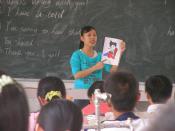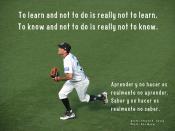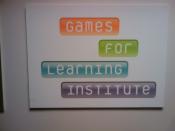Learning and Memory.
We are on the brink of a major revolution in terms of learning. Very few people understand what is about to happen. Even most professional educators are still unaware of the implications that human-computer interaction has on learning. The revolution will occur within the next 10 years and will affect out educational system at all levels.
This revolution in the way people learn will be based on the technology of the digital computer. Learning media from other aspects of modern technology will also figure significantly.
A brief review of the history of learning will help explain the situation. The earliest humans learned primarily through experience and interaction with other humans. Until recently in human history, and even now in early childhood, this has been the principal learning
mode.
In classical Greece, several new learning modes became prominent. One of these was based on the technology of writing, which was already well developed in Greece.
The Greeks realized that written documents could serve as the basis for learning.
The lecture, or group discussion, also seems to have originated in ancient Greece. Perhaps the mode for which Greece is best known is the dialog, exemplified in the works of Plato. Teacher and student worked on a one-to-one basis. The teacher avoided directly lecturing the student, but (by a careful set of questions) led the student to discoveries.
The lecture was a solution to a problem that continues to be of great concern in education which is how to accommodate very large numbers of people who need to learn. The development of print provided another such mass mode which the advent the textbook. Almost 200 years elapsed from the invention of the printing press until the widespread use of textbooks in school environments.
Why will the computer lead to another...



Learning and Memory.
good and short essay about Learning and Memory. but writes used some references in text but where is the reference page
0 out of 0 people found this comment useful.